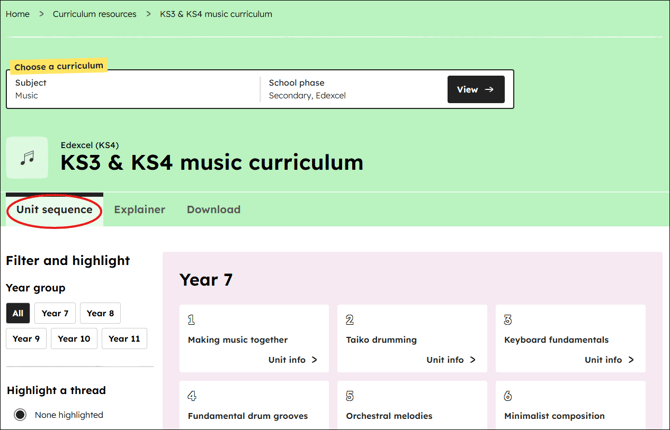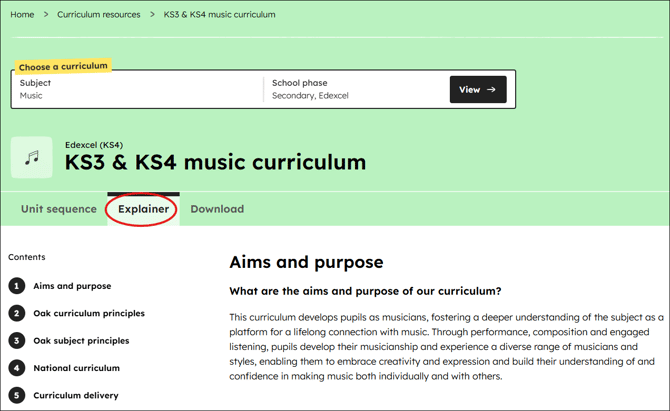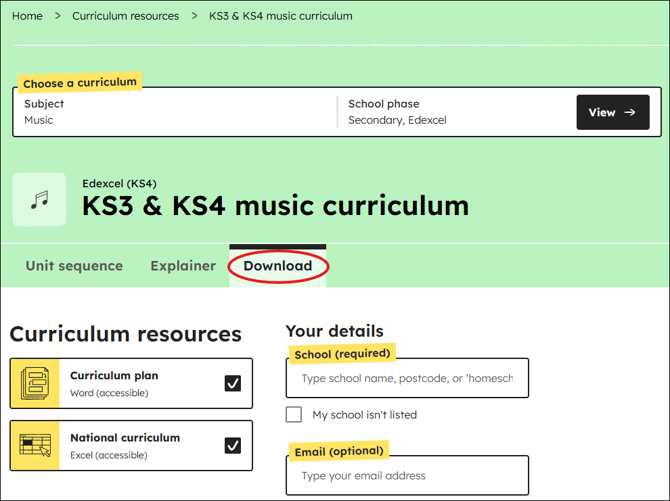Our music curriculum
Find out more about our music curriculum and read our FAQs
Contents
- Introduction
- Unit sequence
- Curriculum explainer
- Download
- Are all the music resources available?
- Secondary FAQs
✅Preparing for the revised national curriculum
We're updating our teaching resources and curriculum plans and sharing guidance to help schools prepare confidently and reduce workload ahead of the revised curriculum in September 2028, and the updated GCSEs beyond.
Sign up now to receive: 
- the latest updates
- expert guidance
- invitations to webinars
- free resources and helpful content.
Introduction
We’ve worked closely with curriculum partners, subject experts and teachers on our interactive music curriculum plan. You can also download the plan to use offline to help with your planning.
Our curriculum partners for music are:
- Primary music: Bristol Beacon and Cathedral Schools Trust
- Music secondary: Knowledge Schools Trust
You can read more about how our expert groups helped shape our curriculum thinking in our Blog: Collaborating with our music expert group.
Find out more about how to use our interactive curriculum plans and adapt them for your school in our help article: A guide to our curriculum plans.
Unit sequence

You can view our curriculum sequence using the unit sequence tab. It will display the units available for each year group, how many lessons are available in a unit and a recommended order.
All units have a description of 'why this, why now' and 'prior knowledge requirements' to help you consider the sequence of your current planning.
You can look at how threads develop across an entire phase or filter the view to see a single year group.
Curriculum explainer

We've added a curriculum explainer to our music curriculum to help you understand our thinking when we were making them with our curriculum partners.
For music this will help you understand:
- our overarching curriculum approach and the subject principles we used
- how our curriculum reflects the aims and purpose of the national curriculum
- information on delivering it in your school
- how we use threads to provide curriculum coherence.
Download

Download the curriculum plan to help you see all the content in one place, including the explainer, the units and the lessons.
The National curriculum document explains how the Oak music curriculum aligns to the national curriculum.
Are all the music resources available?
All of our lesson planning and teaching resources for primary and secondary maths are available on our website.
Our new units and lessons will all have a ‘New’ label beside them.
![]()
You’ll be able to see what lessons we will be covering in each unit by clicking into the unit information on the unit sequence page.
- Primary music unit sequence
- Music KS3 and 4 unit sequences for:
Secondary FAQs
What’s the full repertoire of music that will be studied?
Music from a range of cultures and across the world, music from the Western classical tradition and a variety of popular music is covered and experienced across the curriculum sequence. In keeping with the flexibility that the national curriculum provides, the most important consideration was to ensure a balanced range of music is celebrated and the focus within the sequence is on the skills and knowledge development behind the repertoire.
How are we teaching notation?
The teaching of notation will mainly align with the keyboard performance units promoting understanding through instrumental performance and through exploration of sound.
Listening is not part of the threads. Where is listening included within the curriculum?
Listening is integral to all the units and is therefore not singled out in the threads or in particular units. Through listening, performing and composing, pupils will develop a deeper understanding of the music they experience. Some of this will be in an historical and cultural context, but it is also about understanding the conventions of the music and why the music they engage with is successful.
Key stage 3
What is the balance between singing, keyboard and DAW composition like across the units?
There are three broad strands throughout KS3 which allow pupils to experience the curriculum through one of the following mediums: singing, the keyboard and digital audio workstations (DAW). Through the singing units, pupils will be introduced to solfege with the aim of encouraging development of aural skills and the units are sequenced to encourage development of group singing skills. The choice to focus on keyboard skills specifically allows the chance for pupils to develop some fluency within the limited time capacity there is at KS3 to take advantage of the keyboard as a tool to access the curriculum, one that can be extended into GCSE as necessary and one that also will be reinforced and useful in the DAW units. The main focus of the DAW units will be developing composition skills. Whilst the curriculum can be experienced as a whole, either one of the three strands could be taken to complement existing curriculums.
Why do the KS3 units have four lessons rather than six?
The KS3 units are designed to work within four lessons, but where teachers feel they could spend more time on a particular aspect, this allows scope to do this and have teaching time to adapt the lesson. If the curriculum sequence is followed it also allows for assessment across a few short units.